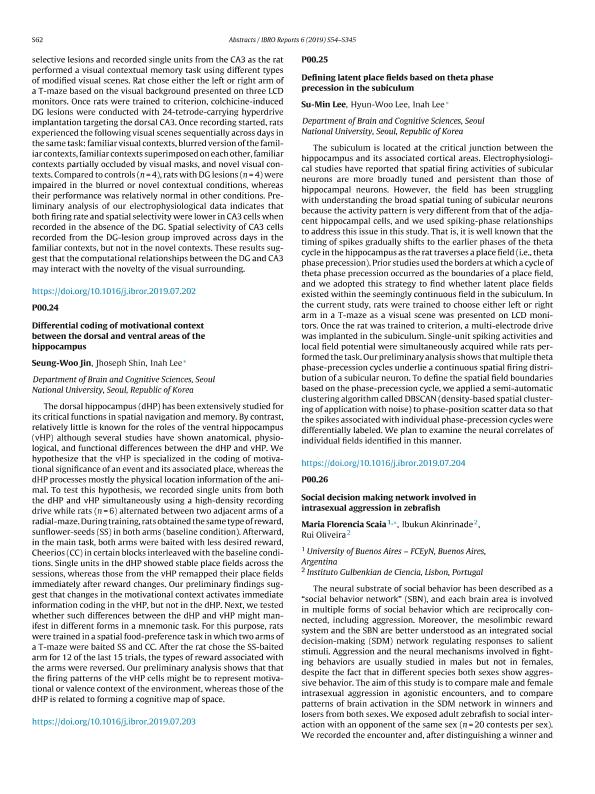Mostrar el registro sencillo del ítem
dc.contributor.author
Scaia, María Florencia

dc.contributor.author
Akinrinade, Ibukun
dc.contributor.author
Oliveira, Rui
dc.date.available
2021-04-26T15:10:54Z
dc.date.issued
2019
dc.identifier.citation
Social decision making network involved in intrasexual aggression in zebrafish; 10th IBRO World Congress; Daegu; Corea del Sur; 2019; S62-S63
dc.identifier.issn
2451-8301
dc.identifier.uri
http://hdl.handle.net/11336/130839
dc.description.abstract
The neural substrate of social behavior has been described as a “social behavior network” (SBN), and each brain area is involved in multiple forms of social behavior which are reciprocally connected, including aggression. Moreover, the mesolimbic reward system and the SBN are better understood as an integrated social decision-making (SDM) network regulating responses to salient stimuli. Aggression and the neural mechanisms involved in fighting behaviors are usually studied in males but not in females, despite the fact that in different species both sexes show aggressive behavior. The aim of this study is to compare male and female intrasexual aggression in agonistic encounters, and to compare patterns of brain activation in the SDM network in winners and losers from both sexes. We exposed adult zebrafish to social interaction with an opponent of the same sex (n = 20 contests per sex). We recorded the encounter and, after distinguishing a winner and a loser, samples were collected to determine brain activation by immunohistochemistry of the phosphorylated ribosomal protein pS6. The latency did not vary between sexes, while the time of resolution is shorter in females. Our results suggest that in both sexes, animals exposed to social interaction had higher overall brain activation than non-interacting controls. Moreover, females show more overall brain activation than males. In order to study how brain activation is interconnected among different areas in each social group, we performed network analysis. Our analysis suggests that female winners have a brain network with majority of positive correlations, while brain network in female losers is more similar to males, with mainly negative correlations. These results suggest that, even though intrasexual aggression follows similar structure and behavioural displays in both sexes, females solve conflict faster than males and this could be related to differential pattern of brain activation.
dc.format
application/pdf
dc.language.iso
eng
dc.publisher
Elsevier

dc.rights
info:eu-repo/semantics/openAccess
dc.rights.uri
https://creativecommons.org/licenses/by-nc-sa/2.5/ar/
dc.subject
SOCIAL BEHAVIOR
dc.subject
SOCIAL DECISION MAKING NETWORK
dc.subject
BRAIN ACTIVATION
dc.subject
FUNCTIONAL CONECTIVITY
dc.subject.classification
Otros Tópicos Biológicos

dc.subject.classification
Ciencias Biológicas

dc.subject.classification
CIENCIAS NATURALES Y EXACTAS

dc.title
Social decision making network involved in intrasexual aggression in zebrafish
dc.type
info:eu-repo/semantics/publishedVersion
dc.type
info:eu-repo/semantics/conferenceObject
dc.type
info:ar-repo/semantics/documento de conferencia
dc.date.updated
2021-04-21T14:53:02Z
dc.journal.volume
6
dc.journal.number
Supl.
dc.journal.pagination
S62-S63
dc.journal.pais
Países Bajos

dc.journal.ciudad
Amsterdam
dc.description.fil
Fil: Scaia, María Florencia. Consejo Nacional de Investigaciones Científicas y Técnicas. Oficina de Coordinación Administrativa Ciudad Universitaria. Instituto de Biodiversidad y Biología Experimental y Aplicada. Universidad de Buenos Aires. Facultad de Ciencias Exactas y Naturales. Instituto de Biodiversidad y Biología Experimental y Aplicada; Argentina
dc.description.fil
Fil: Akinrinade, Ibukun. Instituto Gulbenkian de Ciencia; Portugal
dc.description.fil
Fil: Oliveira, Rui. Instituto Gulbenkian de Ciencia; Portugal
dc.relation.alternativeid
info:eu-repo/semantics/altIdentifier/url/https://www.sciencedirect.com/science/article/pii/S2451830119302572
dc.relation.alternativeid
info:eu-repo/semantics/altIdentifier/doi/https://doi.org/10.1016/j.ibror.2019.07.205
dc.conicet.rol
Autor

dc.conicet.rol
Autor

dc.conicet.rol
Autor

dc.coverage
Internacional
dc.type.subtype
Congreso
dc.description.nombreEvento
10th IBRO World Congress
dc.date.evento
2019-09-21
dc.description.ciudadEvento
Daegu
dc.description.paisEvento
Corea del Sur

dc.type.publicacion
Journal
dc.description.institucionOrganizadora
International Brain Research Organization
dc.source.revista
IBRO Reports
dc.date.eventoHasta
2019-09-25
dc.type
Congreso
Archivos asociados
